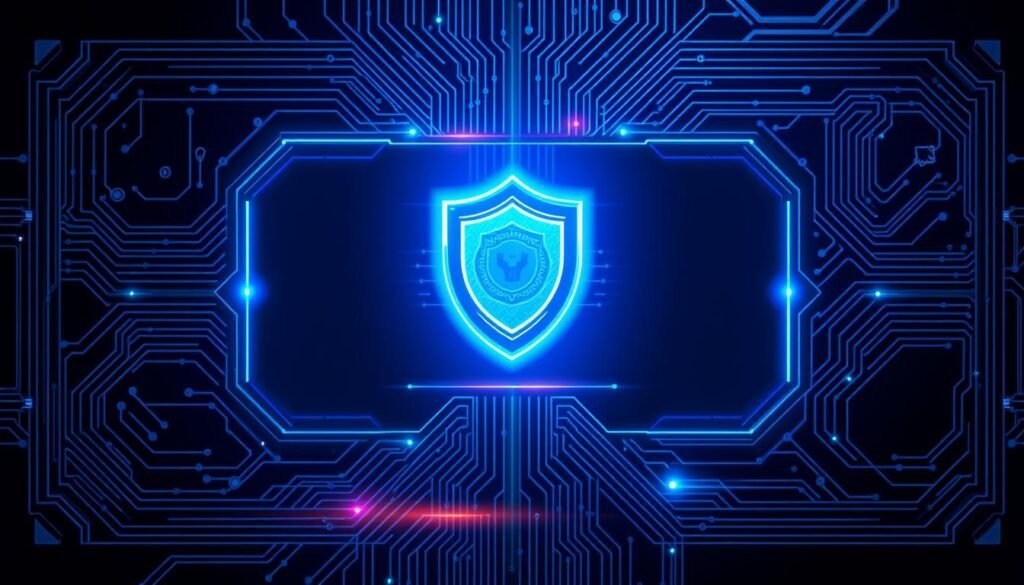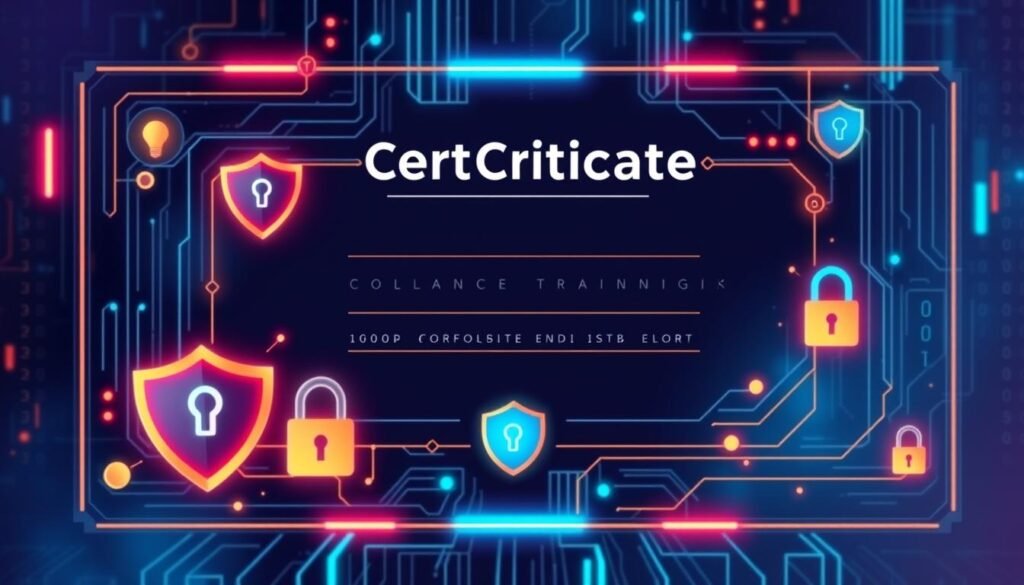Did you know that over 20% of Australian businesses have faced cyber attacks in the past year? The digital landscape’s rapid evolution underscores the critical need for skilled cybersecurity professionals. In today’s era, where IT security training is indispensable, grasping cybersecurity basics is no longer optional but imperative for both individuals and organisations.
Australian businesses are increasingly acknowledging the importance of online cybersecurity training. They are investing in digital security certifications to protect sensitive data and uphold consumer trust. This article will delve into the core elements of premier online cybersecurity training. It will also shed light on how to improve your skills and career prospects in this crucial field.
Key Takeaways
- Cyber attacks pose a significant threat to Australian businesses.
- Investing in online cybersecurity training is crucial for career advancement.
- Digital security certifications enhance trust and protect sensitive data.
- Understanding cybersecurity is essential in today’s digital age.
- Flexibility of online training makes it accessible to everyone.
Introduction to Online Cybersecurity Training
In our rapidly digitising world, the necessity for online cybersecurity training has grown exponentially. It serves as a cornerstone for individuals aiming to bolster their capabilities in safeguarding critical information. These educational endeavours equip participants with the tools to counteract cyber threats, impacting both organisations and individuals.
What is Cybersecurity Training?
Cybersecurity training encompasses a spectrum of courses aimed at imparting the basics of protecting computer systems and networks against digital assaults. Learners are introduced to diverse security protocols, threat detection methodologies, and optimal practices to safeguard data integrity. The culmination of such training often results in a digital security certification, affirming one’s expertise in the realm of cybersecurity.
Importance of Cybersecurity Skills in Australia
The escalating prevalence of cybercrime in Australia underscores the imperative for enhanced cybersecurity competencies. Data from the Australian Cyber Security Centre (ACSC) underscores the escalating threat landscape, with businesses and individuals facing a plethora of online dangers. Thus, acquiring relevant knowledge through online cybersecurity training becomes indispensable for those committed to digital security. The continuous refinement of these skills not only strengthens individual and organisational defenses but also contributes to a more secure online environment nationwide.
Benefits of Online Training for Cybersecurity
Opting for online training in cybersecurity unveils a plethora of advantages, rendering it an attractive choice for many. The advent of remote cyber learning has democratized skill enhancement, liberating learners from the confines of traditional classrooms.
Flexibility and Convenience
Online cyber security courses epitomize flexibility. Learners dictate their study schedule and location, seamlessly integrating education with personal and professional obligations. This adaptive model is particularly beneficial for career professionals, allowing them to upskill without disrupting their daily routines.
Cost-Effectiveness
Cost considerations play a pivotal role in training decisions. Remote cyber learning is generally more economical than traditional classroom settings. It reduces expenses on transportation, lodging, and tuition, making high-quality cyber security education more accessible. This financial benefit broadens the scope of skill acquisition, fostering a more inclusive learning environment.
Overview of Cybersecurity Threats
In Australia, the prevalence of cyber threats has escalated, affecting both individuals and entities. Recognising these challenges is imperative for anyone engaged in online activities. Engaging in virtual cyber classes can deepen one’s understanding of these threats, thereby enhancing security awareness.
Common Cyber Threats in Australia
Australians encounter a variety of cyber threats, including:
- Phishing: This technique involves deceiving individuals into revealing sensitive information.
- Malware attacks: Malicious software designed to disrupt systems or steal data.
- Data breaches: Unauthorized access to sensitive information, affecting privacy and security.
Statistics reveal a significant rise in these incidents, underscoring the necessity for protective measures. Enrolling in an internet security course offers invaluable insights into these threats. It teaches individuals how to identify and counteract them effectively.
The Importance of Staying Updated
The cyber landscape is in a state of constant evolution, necessitating a continuous update on the latest threats. Initiating ongoing education, such as virtual cyber classes, cultivates resilience against emerging cybercriminal tactics. Grasping recent trends enhances the capacity to defend against potential attacks, ensuring the security of personal and organisational information.
Types of Cybersecurity Training Programs
The escalating need for proficient cybersecurity professionals has precipitated the proliferation of diverse training programs. These programs cater to a spectrum of experience levels, facilitating the navigation of career trajectories. From foundational courses to specialised certifications, they offer profound insights into the realm of digital security.
Beginner Courses
Beginner courses serve as an indispensable gateway to the foundational principles of cybersecurity. They encompass critical topics, including:
- Basic principles of cyber defense training
- Understanding common cyber threats
- Introduction to key tools and technologies
These courses establish a robust foundation for novices, enabling them to acquire technical competencies and bolster their confidence.
Advanced Specializations
Advanced specialisations are designed for individuals with prior experience in IT or cybersecurity. These programs explore intricate areas such as:
- Network security
- Incident response
- Ethical hacking
Participants are exposed to sophisticated techniques and methodologies, preparing them to tackle the complexities of the digital environment.
Certifications
Acquiring a digital security certification from esteemed institutions significantly enhances one’s professional standing. Renowned certifications include CompTIA Security+, Certified Information Systems Security Professional (CISSP), and Certified Ethical Hacker (CEH). These qualifications not only bolster job prospects but also signify a dedication to continuous professional growth. Online platforms abound with preparation courses, offering indispensable resources and study materials for achieving certification success.
Seize the opportunity to propel your cybersecurity career forward. Investigate training programs that align with your professional aspirations. For a comprehensive overview of available courses and certifications, explore the myriad options available online.
Choosing the Right Online Cybersecurity Training
Identifying the optimal online cybersecurity training necessitates a meticulous evaluation of your current expertise and future objectives. The selection of appropriate cyber security courses is pivotal in refining your competencies. Your understanding of the desired outcomes will significantly influence your choice.
Assessing Your Skill Level
Initiate by evaluating your current proficiency. Determine whether you are at the outset of your journey or possess foundational knowledge. This evaluation will streamline your search for suitable programs. Consider the following aspects:
- Self-Assessment: Assess your grasp of fundamental cybersecurity principles.
- Experience: Reflect on any prior courses or hands-on experiences.
- Learning Goals: Specify the particular abilities you aim to develop through your training.
Comparing Different Courses
After evaluating your skill level, proceed to compare diverse courses to identify the most suitable one. Not all online cybersecurity training programs are equivalent. Consider the following factors:
- Course Structure: Seek a structured program that aligns with your learning style.
- Instructor Credentials: Investigate the qualifications and industry experience of the trainers.
- Reviews and Ratings: Examine feedback from past students to assess the program’s efficacy.
- Accreditations: Verify that the program is acknowledged within the cybersecurity sector.
Interactive Learning Methods
In the ever-changing realm of cybersecurity training, interactive learning methods are pivotal in enriching the educational journey. These approaches, encompassing live webinars and workshops alongside self-paced learning options, are tailored to accommodate diverse learning styles and preferences.
Live Webinars and Workshops
Engagement in live webinars and workshops creates a dynamic environment where students can engage with instructors and peers in real-time. This real-time interaction facilitates immediate feedback and clarifies complex concepts inherent in web-based cyber programs. The exchange during these sessions enhances comprehension and solidifies knowledge.
Self-Paced Learning
Conversely, self-paced learning caters to those who value flexibility in their study schedules. This approach empowers individuals to dictate their own learning pace, accommodating their hectic lifestyles. The ability to revisit complex topics in virtual cyber classes ensures a thorough understanding of critical cybersecurity principles.
For further insights into delivering effective online cybersecurity training, consider exploring this resource.
Industry-Recognised Certifications
In the rapidly evolving cybersecurity domain, acquiring a recognised certification can profoundly elevate an individual’s professional standing and career prospects. These certifications enable professionals to showcase their proficiency in various cybersecurity domains, thereby affirming their capability in a fiercely competitive market.
Popular Cybersecurity Certifications
Among the most esteemed certifications are:
- CompTIA Security+: This certification encompasses fundamental principles for network security and risk management, establishing a foundational base for a career in cybersecurity.
- Certified Information Systems Security Professional (CISSP): Globally recognised, this certification guarantees expertise in managing and safeguarding critical security assets.
- Certified Ethical Hacker (CEH): Specialising in offensive security, this certification empowers individuals with the competencies required to evaluate the security posture of systems through simulated attacks.
How Certifications Enhance Career Opportunities
Obtaining a digital security certification or completing cyber defense training profoundly influences career trajectories. These certifications not only validate an individual’s knowledge but also lead to:
- Access to advanced job roles.
- Enhanced earning potential.
- Greater job stability within the technology sector.
As the demand for cybersecurity professionals escalates, possessing these certifications emerges as a strategic advantage in attaining long-term career objectives.
Real-World Applications of Cybersecurity Skills
Cybersecurity skills have become indispensable across various sectors, underscoring the significance of online cybersecurity training. In the finance and healthcare domains, professionals are entrusted with the responsibility of safeguarding sensitive data. Conversely, the education sector prioritises the protection of personal information. These practical applications underscore the imperative of having robust IT security training in place.
Use Cases in Various Industries
Diverse industries showcase the multifaceted applications of cybersecurity skills:
- Finance: Financial institutions heavily rely on cybersecurity measures to safeguard transactions and adhere to regulatory standards.
- Healthcare: Given the vulnerability of sensitive patient information, healthcare providers must adhere to stringent cybersecurity protocols to avert data breaches.
- Education: Educational institutions increasingly focus on protecting personal and academic data, underscoring the necessity for trained professionals in this field.
Case Studies of Success
Several organisations have successfully integrated cybersecurity measures based on IT security training principles. A leading financial firm, for instance, revamped its data protection strategies following comprehensive online cybersecurity training. By adopting established best practices, the firm notably diminished its susceptibility to cyber threats. For deeper insights, the discussion on revolutionising cybersecurity education highlights the achievements realised through these training initiatives.
The Role of Cybersecurity in Business

In today’s digital realm, cybersecurity is indispensable for business operations. Companies encounter numerous cyber threats that jeopardise sensitive information. Thus, deploying effective cybersecurity strategies is crucial for safeguarding customer data integrity and confidentiality. Cyber defense training empowers organisations to confront these challenges adeptly.
Protecting Sensitive Information
Businesses harbour extensive amounts of sensitive data, encompassing personal customer details and confidential business information. Without stringent cybersecurity measures, this data remains susceptible to breaches. Through cyber defense training, employees can identify potential threats and proactively mitigate data breaches. Additionally, obtaining a digital security certification fortifies an organisation’s security stance, showcasing a dedication to customer data protection.
Building Customer Trust
A robust cybersecurity posture is pivotal in fostering customer trust. When customers perceive their information as secure, they are more inclined to engage and remain faithful to a brand. Advanced security measures offer peace of mind, enhancing customer relations and driving business prosperity. As organisations pursue digital security certification, they bolster their defensive capabilities and market reputation. Continuous investment in cyber defense training is imperative to stay vigilant against evolving threats and uphold customer trust.
Staying Ahead of Cybersecurity Trends
The cybersecurity domain is in a state of perpetual evolution, driven by the advent of novel technologies that are redefining the very fabric of security protocols. For those embarking on an internet security course or participating in online cybersecurity training, it is imperative to stay abreast of these developments. This knowledge is not merely advantageous; it is essential for preparing for the forthcoming job market.
Emerging Technologies
At the vanguard of cybersecurity innovation are Artificial Intelligence (AI), Machine Learning, and blockchain technology. These innovations facilitate:
- Real-time threat detection, significantly curtailing response times.
- Automated security protocols, elevating the efficacy of security measures.
- Enhanced data integrity through blockchain applications, rendering data manipulation increasingly challenging.
Remaining current with the application of these technologies in cybersecurity ensures that those pursuing an internet security course or online cybersecurity training remain at the forefront.
Future Skills in Demand
As technological progress accelerates, the demand for particular skill sets will escalate. Professionals will need to concentrate on:
- Comprehending AI-driven security solutions.
- Developing proficiency in data analytics for anticipatory threat assessment.
- Understanding blockchain security to safeguard sensitive information.
Participating in specialized online cybersecurity training can equip individuals with these skills, ensuring they remain competitive within the rapidly evolving digital environment.
Community Support and Networking
The establishment of a robust network and the acquisition of community support are pivotal in the cultivation of a thriving career in cybersecurity. The act of engaging with peers and industry stalwarts cultivates a collaborative environment, offering indispensable resources that augment both comprehension and proficiency in the domain. This collaborative ethos is notably prevalent in forums and local gatherings, where individuals with a penchant for cyber security courses can disseminate and acquire knowledge and experiences.
Joining Cybersecurity Forums
Engagement in online cybersecurity forums serves as an efficacious conduit for connecting with individuals harbouring analogous interests. These forums act as a venue for the discussion of diverse topics pertinent to remote cyber learning, encompassing practical advice to the most recent industry developments. Notable platforms include:
- LinkedIn groups dedicated to cybersecurity
- Reddit communities focused on technical dialogues
- Specialised websites such as CyberSecForum
Through these mediums, one can pose inquiries, disseminate resources, and acquire wisdom from seasoned professionals within the field.
Local Networking Events in Australia
Australia is replete with networking events specifically tailored for cybersecurity aficionados and professionals. Participation in these events facilitates face-to-face interactions, the exchange of insights, and the exploration of potential employment prospects. The advantages of local networking encompass:
- Interactions with industry luminaries and contemporaries
- Insights into nascent trends and technologies
- Exploration of potential employment opportunities and internships
Seek out events via platforms such as meetup.com or by following pertinent organisations that orchestrate seminars and workshops. Engagement with the local cybersecurity community can markedly augment your educational odyssey.
Common Misconceptions about Cybersecurity Training

Many individuals harbour misconceptions about cybersecurity training, often believing it targets only IT professionals or that it presents too steep a challenge for newcomers. These myths can discourage a diverse range of potential learners from pursuing essential skills in digital security. Understanding these misconceptions can open doors for many to benefit from cyber defense training and attain valuable digital security certification.
Debunking Myths
One common myth is that only people with a background in IT can succeed in this field. In reality, anyone with a dedication to learning can embark on this journey. Courses tailored for beginners are readily available, making the transition into cybersecurity more accessible.
Another misconception is that the learning process is overwhelmingly difficult. While cybersecurity does involve complex concepts, structured training programs break down these challenges into manageable steps. Persistence and the right resources, such as engaging online courses, can facilitate a smoother learning experience. For more insights into these misconceptions, check out this resource.
Understanding the Learning Curve
The journey to mastering cybersecurity concepts features a learning curve, which many find intimidating. However, recognising that each learner progresses at their own pace can foster a more positive outlook. Engaging with comprehensive cyber defense training programs equips individuals with practical skills, which gradually builds confidence in their abilities.
In summary, potential learners should embrace the opportunity to enhance their skills in cybersecurity. With proper guidance and determination, achieving a digital security certification becomes a tangible goal for all aspiring professionals.
Conclusion: Your Path to a Cybersecure Future
As you conclude your exploration into online cybersecurity training, it’s crucial to contemplate the subsequent steps in your IT security training journey. Acknowledging cybersecurity’s importance in today’s digital realm is merely the starting point. Enrolling in pertinent courses will arm you with the requisite knowledge to confront actual threats efficiently. Pursuing certifications that affirm your expertise and showcase your dedication to potential employers is also imperative.
Next Steps in Your Cybersecurity Journey
Initiating action is paramount. Begin by assessing your current skill set and pinpointing courses that resonate with your professional aspirations. Regardless of whether you opt for foundational or advanced training, remember that acquiring knowledge is an ongoing endeavour. Participate in online forums focused on cybersecurity, where you can exchange experiences, seek advice, and connect with industry professionals.
Resources for Further Learning
To deepen your knowledge, delve into a range of educational resources. Investigate influential cybersecurity books or subscribe to websites pertinent to the field, offering insights into the latest trends and methodologies. Moreover, numerous organisations provide tailored support and learning avenues for cybersecurity aficionados, ensuring your continuous engagement in IT security training. By embarking on these measures, you not only advance towards a fulfilling career but also contribute to a more secure cyber environment.
